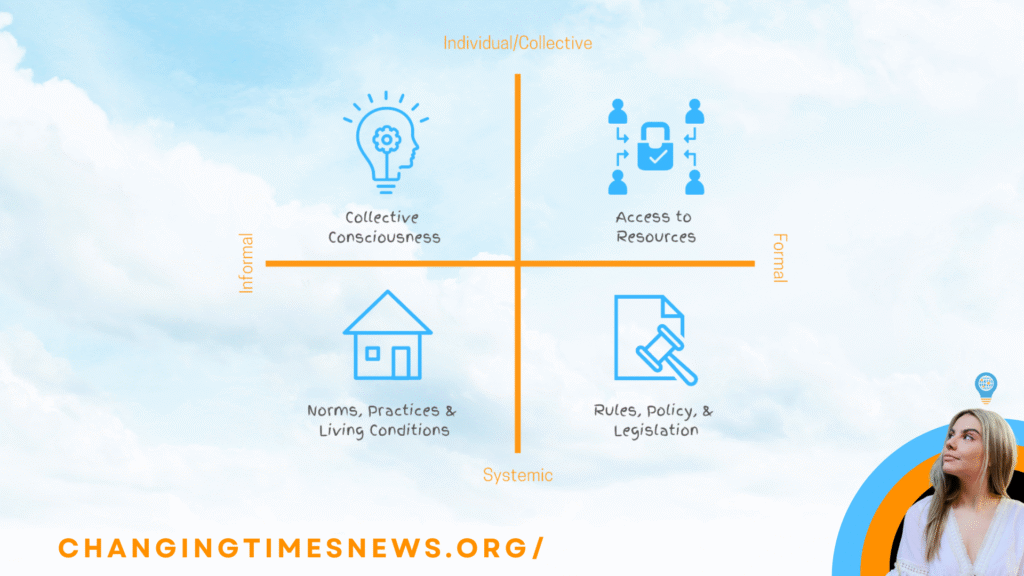At this year’s New Economy Network Australia (NENA) conference, Life After Capitalism, a panel of young activists and researchers gathered to share their visions for a post-capitalist world. Their discussion highlighted not only the urgency of ecological and social crises, but also the creativity, courage, and care that young people are bringing to the movement for systemic transformation.
A Generation Born Into Crisis
Unlike older generations who watched the climate crisis and neoliberalism unfold, today’s young people have never known a world without these realities. This shared starting point shaped much of the panel’s conversation. As one participant put it, “we were born after the climate crisis was well on its way, and after neoliberalism was deeply entrenched.” For many, activism began not as a choice, but as a response to a frightening world.
Panelists’ journeys ranged from refugee solidarity activism at age 11, to grassroots climate action, to policy studies, to building networks for youth changemakers. While their approaches varied, all were grounded in the recognition that the current system—rooted in capitalism, colonialism, and extractivism—cannot deliver a just or sustainable future.
Theories of Change: From Direct Action to Care
One of the central questions posed to the panel was: How does change happen?
- Direct Action as Disruption: For Bella and Elvie, direct action—targeting economic bottlenecks, disrupting “business as usual,” and organizing mutual aid—remains the most powerful way to challenge oppressive systems. History, they argued, shows that disruptive movements—from suffragettes to Black Lives Matter—are what force societies to pay attention.
- Dynamic and Adaptive Frameworks: Tiyana, drawing from her PhD research and work with the Humanitarian Changemakers Network, emphasized the importance of theories of change that are dynamic and evolving. She described change as an ecosystem, more like a garden than a linear path: it requires planting seeds, tending them slowly, and adapting to whatever emerges.
- Critical Mass and Collapse as Invitation: Tarik reflected on the inevitability of ecological and social breakdown, suggesting that collapse itself may become an invitation to transformation. Rather than fearing the end of modern comforts, he sees crisis as a moment to embrace new ways of living and organizing.
Together, these perspectives underscored that building a new economy requires a diversity of strategies: resistance, alternatives, capacity-building, and policy engagement.
Barriers and Supports: Youth in the Movement
The panel also explored the unique barriers and enablers young people face in joining the movement.
- Lack of Mentorship: Several speakers pointed out that youth often find themselves expected to “volunteer their skills” rather than being meaningfully mentored. Without intergenerational transmission of knowledge, decades of experience risk being lost.
- Communities of Care: At the same time, youth are pioneering cultures of care—living collectively, sharing resources, practicing conflict resolution, and providing mutual support. These communities make activism sustainable by countering the isolation, burnout, and fear that many young people feel.
- Safety and Security: Tiana stressed that empowerment requires safety—whether financial, psychological, or physical. Without basic security, young people struggle to commit to activism. Building cultures that offer safety and care, she argued, is as important as building campaigns.
Beyond Single Issues: Interconnected Struggles
Another theme was the need to move beyond single-issue activism. Panelists described how work on climate, refugee rights, feminism, and anti-racism quickly reveals their interconnection. Capitalism, colonialism, patriarchy, and ecological destruction are deeply intertwined; resisting one requires resisting all.
Decolonization, anti-racism, and intersectionality emerged as central values. As Bella put it, “capitalism becomes synonymous with colonialism, and all that we have now comes at the expense of First Nations peoples.” Any post-capitalist vision, she argued, must begin with confronting this truth.
Slowing Down, Even in Urgency
Perhaps the most poignant tension was between the urgency of action and the need for reflection. For some, the devastation already unfolding demanded immediate and drastic action. For others, this sense of urgency risked reproducing the hyper-accelerated culture of capitalism itself. As Tarik noted, “times are urgent, but we need to slow down.” The challenge, then, is to act quickly without reproducing the very systems activists seek to dismantle.
A Shared Vision Emerging
While their perspectives diverged, what united these young changemakers was a refusal to accept the status quo. Whether through direct action, policy, education, or mutual aid, they are experimenting with ways of living and organizing that embody care, justice, and ecological balance.
The youth panel was not a tokenistic inclusion—it was a glimpse into the future of the movement. If older generations can offer mentorship and resources, while allowing youth to lead with creativity and courage, the seeds of a new economy may yet take root.
As one panelist reminded the room: “Change isn’t a destination. It’s an ongoing, dynamic process. We just have to keep planting the seeds.”


